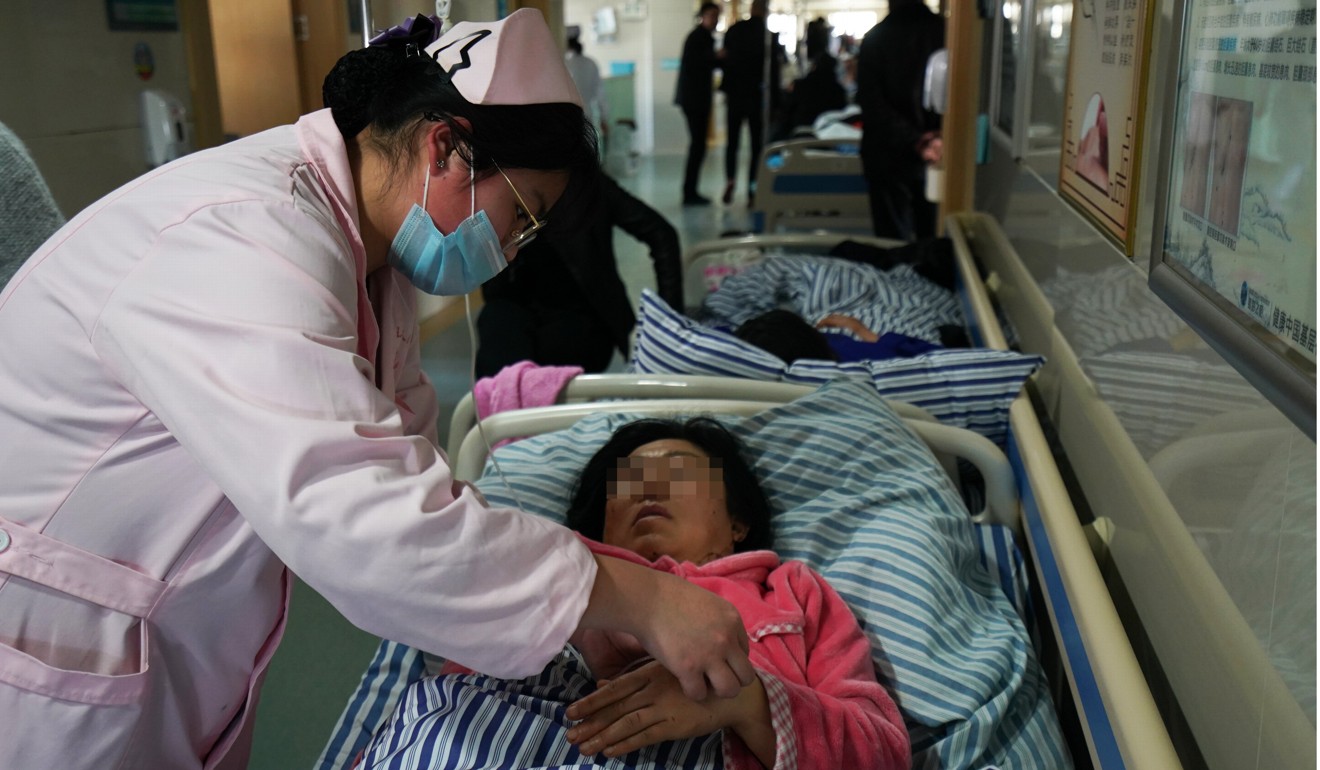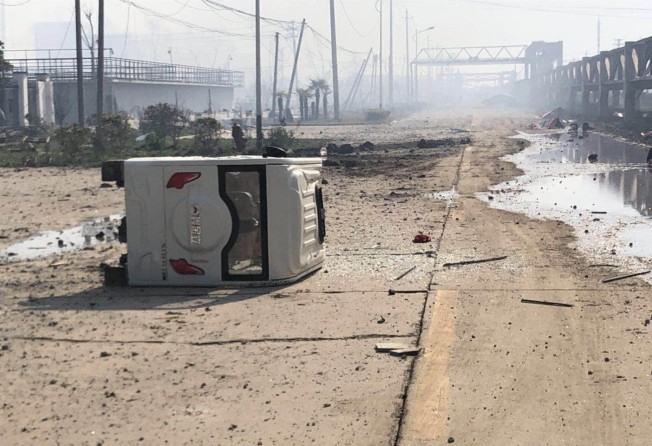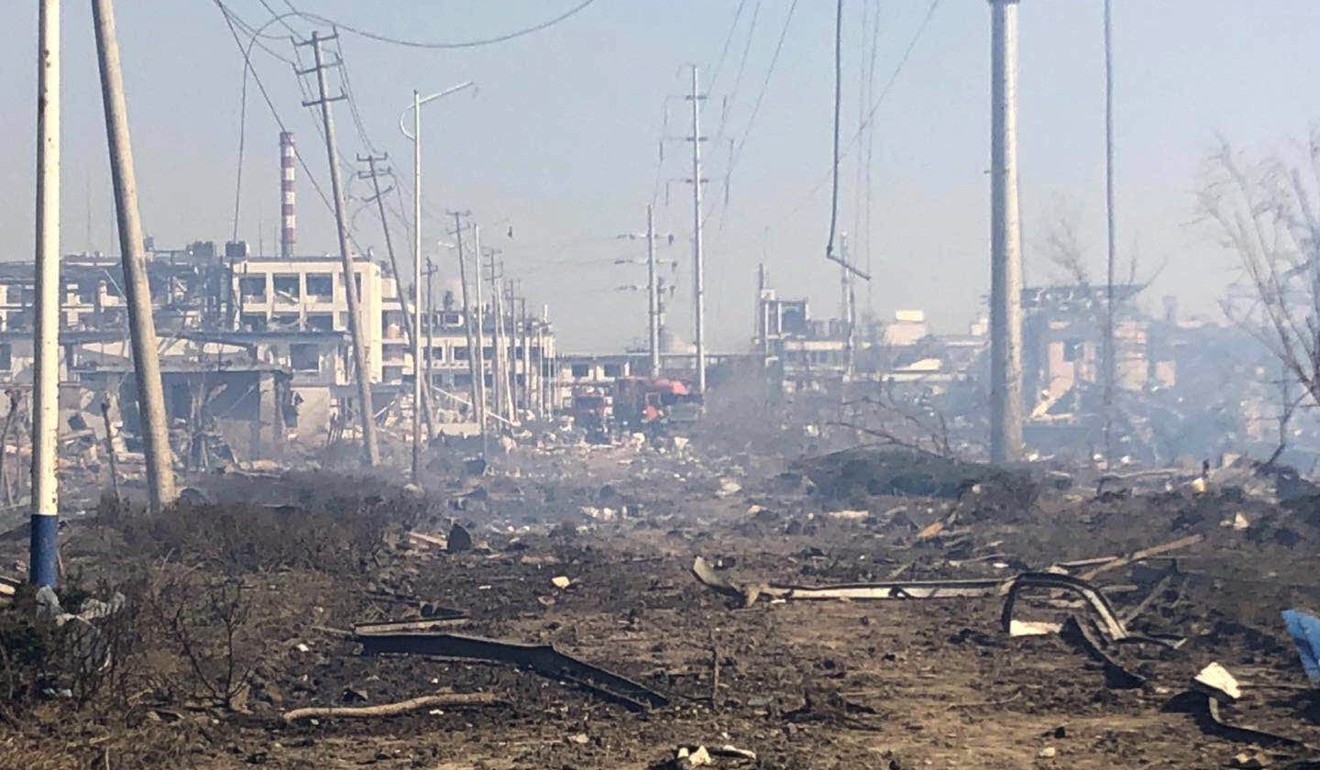
China sends task force to probe blast at chemical plant where green group says ‘problems were known’
- Senior cabinet official Wang Yong will direct the rescue and emergency response efforts in Yancheng
- Thirteen safety issues were found at the factory during an inspection last year

Beijing said late on Friday it had sent a senior cabinet official to the site of a chemical plant blast in eastern China and set up a central government task force to investigate the cause of Thursday’s explosion.
But it was cold comfort to residents and environmental groups in Yancheng who believe the explosion at the Chenjiagang industrial park – which left at least 64 people dead and injured more than 600 – could prove their concerns over safety and pollution at the factory were valid.
Zhang Wenbin, from a local environmental protection group, recalled the scene when he arrived at the disaster zone surrounding the Jiangsu Tianjiayi Chemical plant late on Thursday.
“The fire was not extinguished till 12am and the wind was blowing hard,” Zhang said. “We could only survey the scene from upwind of the site – we were worried about the toxic gas downwind.”
He said the nearest village was 500 metres from the plant, and it was deserted after the blast.
Zhang knows the area well – he said he had visited the industrial park with colleagues every year since 2014, testing for air and water pollution.
“The companies in the industrial park are built along the Guanjiang, and there are many hidden pipelines built by those companies to drain waste into the river, which flows into the Yellow Sea,” Zhang said. “In recent years, the environmental management has become more strict – but I don’t know if the pipelines have been removed or not.”

Chenjiagang and two other industrial parks in the north of Jiangsu province were the subject of a state television report in April last year. It said heavy polluters had fled to the parks from the Yangtze River Delta, where local governments have tightened pollution and safety standards. The new plants were apparently welcomed in the less affluent northern part of the province.
China has become one of the world’s largest producers and consumers of chemicals. In 2015, then environment minister Chen Jining said the country had about 25,000 chemical companies producing and using more than 50,000 types of chemicals. More than 20 of those Chinese companies are among the highest in the world in terms of production and consumption of chemicals.
But the country has also seen a number of chemical accidents in recent years – there were 218 in 2017, killing 271 people, according to a Ministry of Emergency Management report. Last year, there were 176 chemical accidents, with 233 deaths.
In January last year, Beijing sent out a team of inspectors to check on the safety of chemical plants in five cities in Jiangsu. Of the 18 factories they inspected, some 208 safety risks were identified. Jiangsu Tianjiayi Chemical was one of the companies that underwent checks – and 13 safety issues were found there.

Ada Kong, a senior programme manager with Greenpeace East Asia, said “the problems at those chemical plants were known”. “The blast happened because of insufficient supervision and inadequate safety management,” Kong said.
She said when her colleagues visited the nearby Lianyungang industrial park with colleagues in 2016, they also found lax enforcement of safety and pollution regulations.
“There was a smell of fumes and there were unregulated chemicals there,” Kong said.
She also said some of the safety standards needed to be tightened, such as the 500-metre minimum distance between a chemical plant and a residential area.
“I don’t think 500 metres is enough to prevent risks – it’s too close,” Kong said. “But there should be precautions in place to prevent a big accident like this, not just the [residential] safe distance.”
Beijing has sent State Councillor Wang Yong to Yancheng to direct the rescue and emergency response efforts, while an investigation group has been set up, led by deputy emergency minister Huang Ming.
Meanwhile, the Jiangsu government issued an emergency directive on Friday to launch a safety overhaul and inspect all potentially hazardous facilities in the province in the aftermath of the blast.